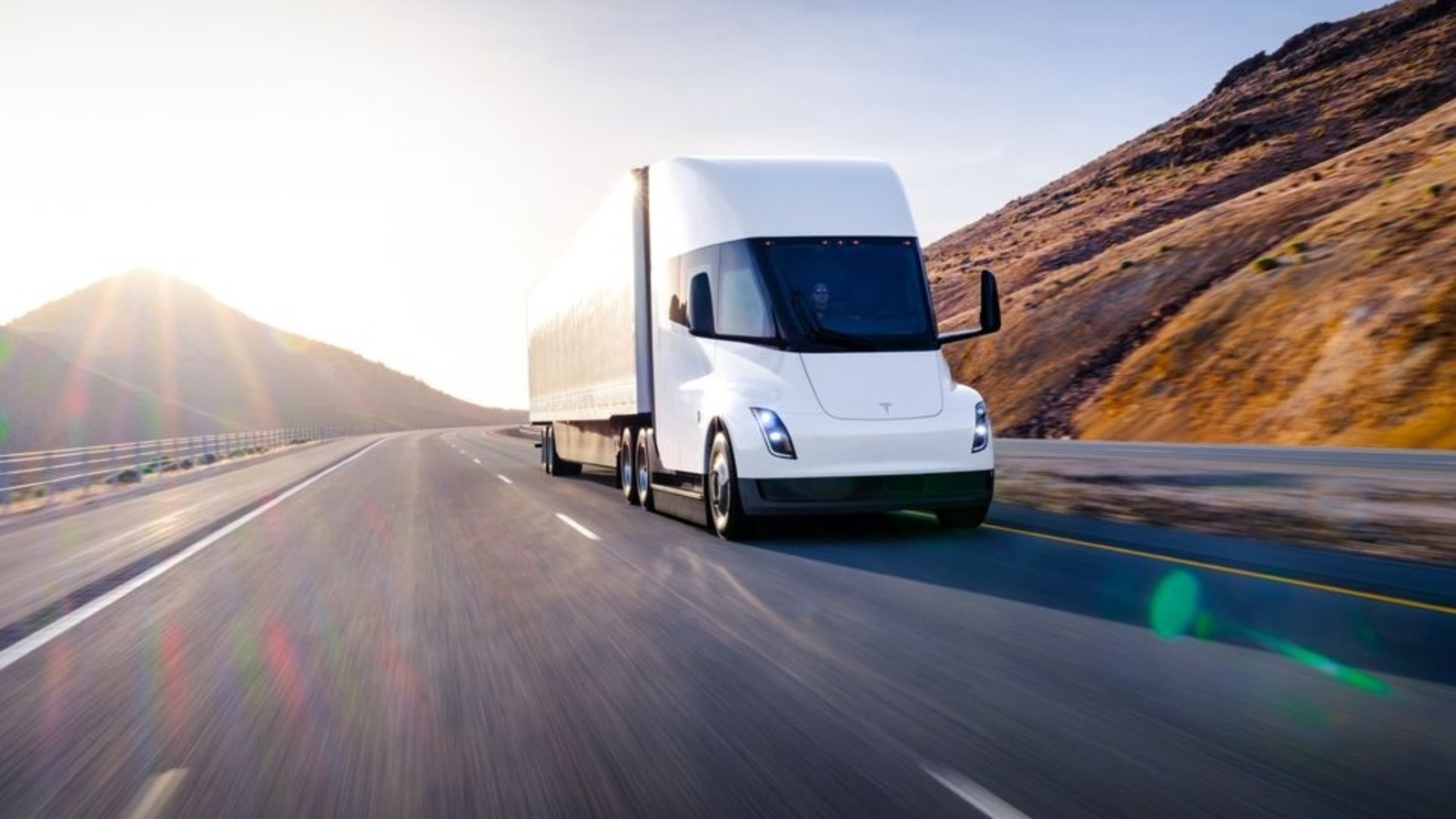Elon Musk’s Impossible Electric Truck Is Getting the Last Laugh
Batteries as heavy as an elephant are not ideal for long-haul trucking, but non-diesel eighteen-wheelers may have found a niche.

When Elon Musk announced plans to upend the long-haul trucking industry five years ago, it was hard to suppress the urge to laugh.
Well before he was developing flamethrowers and humanoid robots, and haggling with Stephen King over Twitter subscription fees, the announcement of the Semi long-distance truck saw the Tesla Inc. chief executive officer picking a fight not just with the established auto industry, but with basic economics and physics.
Batteries have many virtues, but density isn't one of them. That's not a problem for passenger cars, but once you get into truly power-hungry applications like long-distance trucking, shipping and aviation, electric vehicles start to be overwhelmed by the weight of their own power plants.
A Class 8 semi-trailer with half a metric ton of diesel in its tank can haul a 20-ton load for 1,000 miles between refueling stops. There's no way that lithium-ion can compete. The three ton, 540 kilowatt-hour battery on a fully equipped Volvo AB electric truck weighs as much as a rhinoceros. Tesla is more cagey about its battery specifications, but comparisons with Volvo's numbers, teardowns of its passenger cars, and details of its Powerwall battery suggest the 1,000kWh power plant alone on its biggest Semi would tip the scales at nearly six tons. That's similar to an adult male elephant, or an empty school bus.
Even with a lighter power train, such a massive battery pack would make it hard for the Tesla Semi to undercut diesel while staying within the roughly 40-ton overall weight limits that trucks must observe to prevent damage to roads and bridges.
Logistics is an extremely low-margin industry. JB Hunt Transport Services Inc., one of the biggest US operators, last year made roughly $1.63 per mile of revenue in its long-haul intermodal business, roughly half of which goes on fuel. Make the payload smaller to accommodate a pachydermic battery, or reduce range to allow a smaller power plant, or spend more of the day hooked up to a Megacharger, and those meager profits start looking even thinner.
For all the skepticism (including mine) aimed at the Tesla Semi, an infuriating possibility has emerged, though: Musk may end up getting the last laugh.
The first working models of the Semi were delivered last week to PepsiCo Inc., part of an order of 100 vehicles. That's three years behind schedule, but it still happened. More sober carmakers are getting in on the act, too. Alongside Volvo, Daimler Truck Holding AG has had orders for 1,280 zero-emission trucks and buses in the first half of this year, and unveiled a prototype long-haul model in September.
What's changed? If Tesla had made dramatic breakthroughs in battery density, Musk would be boasting about it, so that's not the answer. There's one huge difference in 2022 compared to 2017, however: the cost of diesel.
The decline of domestic oil refining and 2022's squeeze in energy prices have conspired to drive US truck fuel costs up to almost double what they were five years ago. Plug the current prices of Californian diesel and commercial electricity into the trucking expenditure calculator made by logistics-data company ACT Research Co., and even an electric rig that's twice as pricey to buy as a conventional vehicle is getting 12% cost savings every mile, equivalent to nearly $17,000 a year at typical usage levels.
That might not last as diesel prices fall back to earth, but it's close enough to put electric trucking firmly in the game.
The other factor supporting the Semi right now is that it's not trying to offer full-spectrum competition to long-haul trucks. Its range is only half what a Class 8 can do between refueling stops. It's telling, too, that one of its first customers will be a Frito-Lays plant. If you're worried about the challenges of hauling heavy loads as well as your massive batteries, few types of cargo will be more forgiving than feather-light pallets of potato chips.
Logistics is a vast and diverse industry with plenty of niches where electrified trucking might find a place to flourish. Last-mile deliveries from warehouses to stores and homes probably offer the most congenial environment — but even on the more challenging territory of long-haul trucking, the modern economy moves plenty of low-density cargoes like potato chips, throw pillows and apparel where battery trucks may have a chance to shine. Buyers can afford to experiment: the 20 Tesla Semis on order by FedEx Corp. represent a drop in the ocean next to their 86,000-strong road fleet.
Musk may have repeated the trick he followed with Tesla's original electric Roadster. While the rest of the passenger car industry was struggling to build a competitive mass-market electric car, Tesla took the easy route to a premium sports coupe where price was no object. While the truck industry was looking for ways to replace its most-efficient workhorses, Tesla is biting off just enough share to start disrupting the market.
The battery technology to compete directly with the Class 8 diesel trailer still hasn't been invented. The Semi might get electric trucks close enough, though.
Catch all the Latest Tech News, Mobile News, Laptop News, Gaming news, Wearables News , How To News, also keep up with us on Whatsapp channel,Twitter, Facebook, Google News, and Instagram. For our latest videos, subscribe to our YouTube channel.































